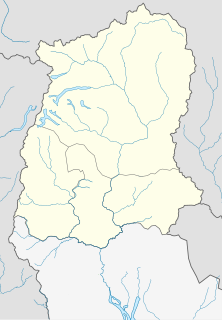This page is based on this
Wikipedia article Text is available under the
CC BY-SA 4.0 license; additional terms may apply.
Images, videos and audio are available under their respective licenses.

Karma means action, work or deed; it also refers to the spiritual principle of cause and effect where intent and actions of an individual (cause) influence the future of that individual (effect). Good intent and good deeds contribute to good karma and happier rebirths, while bad intent and bad deeds contribute to bad karma and bad rebirths.

Jaimini was an ancient Nepali scholar who founded the Mimansa school of Hindu philosophy. He was a disciple of sage Veda Vyasa, the son of Parashara. Traditionally attributed to be the author of the Mimamsa Sutras and Jaimini Sutras, he is estimated to have lived around the 4th-century BCE. His school is considered non-theistic, but one that emphasized rituals parts of the Vedas as essential to Dharma.

Rumtek Monastery, also called the Dharmachakra Centre, is a gompa located in the Indian state of Sikkim near the capital Gangtok. It is a focal point for the sectarian tensions within the Karma Kagyu school of Tibetan Buddhism that characterize the Karmapa controversy.
Karma is a concept of Hinduism which explains causality through a system where beneficial effects are derived from past beneficial actions and harmful effects from past harmful actions, creating a system of actions and reactions throughout a soul's (Atman's) reincarnated lives forming a cycle of rebirth. The causality is said to be applicable not only to the material world but also to our thoughts, words, actions and actions that others do under our instructions.

Karma yoga, also called Karma marga, is one of the four spiritual paths in Hinduism, one based on the "yoga of action". To a karma yogi, right work done well is a form of prayer. It is one of the paths in the spiritual practices of Hindus, others being Raja yoga, Jnana yoga and Bhakti yoga. The three paths are not mutually exclusive in Hinduism, but the relative emphasis between Karma yoga, Jnana yoga and Bhakti yoga varies by the individual.
Nitya karma refers to those karmas which have to be performed daily by Hindus. The Hindu Shastras say that not performing nitya karmas leads to sin. The nitya karmas include:

Putrakameshti is a special Yajna performed in Hinduism for the sake of having a male child/son. It is a kaamya-karma.

Karma is a Sanskrit term that literally means "action" or "doing". In the Buddhist tradition, karma refers to action driven by intention (cetanā) which leads to future consequences. Those intentions are considered to be the determining factor in the kind of rebirth in samsara, the cycle of rebirth.
Pratikramana, is a ritual during which Jains repent (prayaschit) for their sins and non-meritorious activities committed knowingly or inadvertently during their daily life through thought, speech or action.
The Mimamsa Sutra or the Purva Mimamsa Sutras, written by Rishi Jaimini is one of the most important ancient Hindu philosophical texts. It forms the basis of Mimamsa, the earliest of the six orthodox schools (darshanas) of Indian philosophy. According to tradition, sage Jaimini was one of the disciples of sage Veda Vyasa, the author of Mahabharata.

Karma is the basic principle within an overarching psycho-cosmology in Jainism. Human moral actions form the basis of the transmigration of the soul. The soul is constrained to a cycle of rebirth, trapped within the temporal world, until it finally achieves liberation. Liberation is achieved by following a path of purification.
Jain rituals play an everyday part in Jainism. Rituals take place daily or more often. Rituals include obligations followed by Jains and various forms of idol worships.
Karmkand refers to ritual services proferred by swamis or religious Brahmins in exchange for dakshina.

Maya is a 2001 Hindi film directed by Digvijay Singh with Nitya Shetty, Mita Vashisht, Anant Nag and Nikhil Yadav in lead roles.

Wargal Saraswati Temple, or Sri Vidya Saraswati Temple, is a Hindu temple located in Siddipet district in Telangana, India. The deity of education in Hinduism is Goddess Saraswati. It is among the few temples of Saraswati in Telangana. It is maintained by the Kanchi Shanker Mutt. Construction of the temple complex was due to the efforts of Yayavaram Chandrashekhara Sharma, a scholar and adherent of Goddess Saraswati.

Tsangpa was a dynasty that dominated large parts of Tibet from 1565 to 1642. It was the last Tibetan royal dynasty to rule in own name. The regime was founded by Karma Tseten, a low-born retainer of the prince of the Rinpungpa Dynasty and governor of Shigatse in Tsang since 1548.
Khunpang Lhawang Dorje was a prince of the Tsangpa Dynasty that held power in parts of Central Tibet, especially Tsang, between 1565 and 1642.
Jainism has been engaged in debates with the other philosophical and religious traditions, in which its theories and its followers' practices have been questioned and challenged.

"Duende" is the second single from Delerium's album Karma featuring singer Camille Henderson. The single wasn't included on Delerium's Best Of collection.










